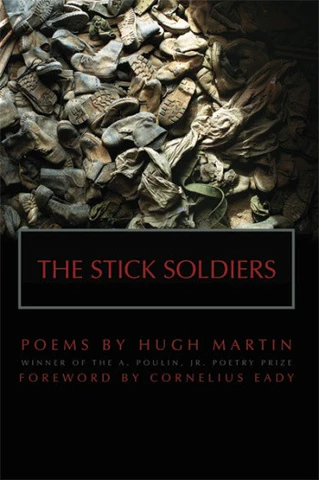The Stick Soldiers by Hugh Martin is a book of poetry but it’s more than a collection of poems. It is a brave, honest and authentic journey of a young man who served six years in the Army National Guard as an M1A1 Tanker and was deployed to Iraq in 2004. This collection of poems is not light reading but it is necessary reading if we are to heal the wounds of war and shorten the divide in our country. This is not about politics, but about poetry. It is about a young man going to war and showing in words and images what he saw and what he felt in the journey he has experienced from boot camp, to war to back home again. It is about putting the pieces together in a way that only The Stick Soldiers can do.
At times the focus of the poet’s intent is almost too close to witness, making the reader feel uncomfortable because war is uncomfortable. Other times, distance is the only way the poet and the reader can possibly look. This distance is perhaps necessary in order to engage within the world of RPGs, IEDs, body bags, body parts, loss and war. Martin doesn’t just show us what it’s like to be an American soldier at war in Iraq; he also shows what it’s like to be an Iraqi child or a homeless man or a father trying to make a living for his family in war. Perhaps a fractured psyche can only look through a soft lense and write what it sees. I use the word fractured respectfully and gently because as I read Martin’s poems, I feel the fracturing of what war does and I also feel the poet’s need and wanting to be whole again. It’s as if the poet is arranging and rearranging words and images and feelings and memories and experiences in each poem and in the collection as a whole in order to make sense of his journey from young man to soldier of war. I have heard a few of our returning young Iraqi and Afghanistan combat soldiers tell me, “War made me a man.”
The Stick Soldiers is a haunting and beautifully written declaration of this same reality. Martin is a poet who is a solider. Or is Martin a soldier who is a poet? Can one separate the poet from the soldier or the soldier from the poet? Not in this collection of poetry and that is why these poems are so incredibly powerful. No matter how many times I may read “M-16A2 Assault Rifle” I have the same feeling when I read the last five words of the poem “…that makes the night blush.” It is sorrow and wonder and regret and hope and love and something I can’t identify but this something resonates so deeply within my psyche it won’t let go. This kind of experience when reading a poem is what poetry is about. The Stick Soldiers is a journey you don’t want to miss. Especially if you care about the soldiers our country sent to war and if you want to help them come home.






